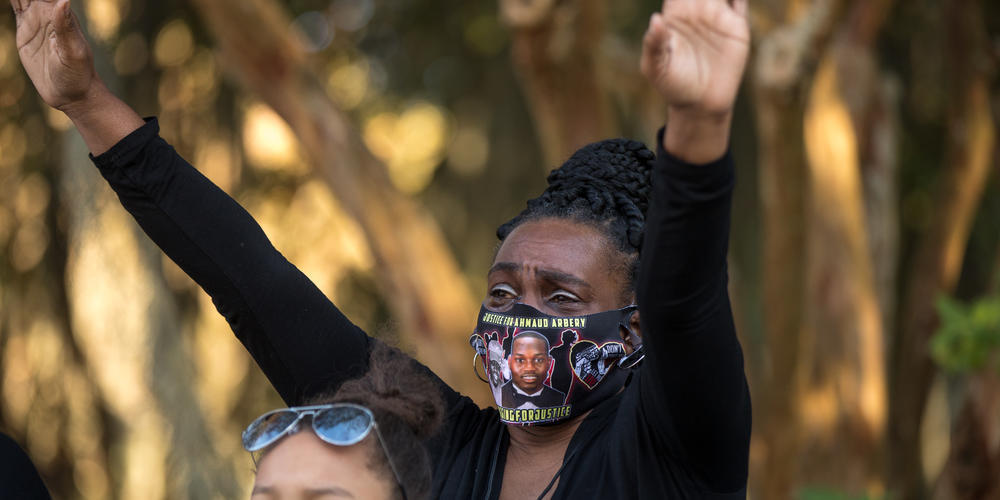
Caption
Ahmaud Arbery's aunt Carla Arbery prays during a vigil outside of the Glynn County Courthouse on October 17, 2021.
Credit: Riley Bunch/GPB News

Ahmaud Arbery's aunt Carla Arbery prays during a vigil outside of the Glynn County Courthouse on October 17, 2021.
The second day of jury selection in the shooting death of Ahmaud Arbery continued Tuesday with jurors questioned about court filings on the Glynn County Court’s website that include documents ruled inadmissible revealing Arbery’s brushes with the law and his mental health history.
At least two jurors admitted Tuesday accessing some of the court documents that can be found on links after clicking instructions for the 1,000 jurors summoned for the high-profile case.
Jury selection continued Tuesday with Chatham County Superior Court Judge Timothy Walmsley calling for the pace to pick up. Meanwhile, jurors faced more questions about their thoughts on the fairness of the criminal justice system, whether they’ve read court documents and if they had already formed an opinion about the guilt or innocence of the three accused murderers Gregory McMichael, Travis McMichael and William “Roddie” Bryan in the February 2020 killing of Arbery, an unarmed 25-year-old Black man out for a jog.
Jurors accessing Arbery’s mental health and criminal records that have already been disallowed in the trial could’ve become a turning point so it’s critical it was caught early enough to weed out potential jurors who read the information, Georgia Southern University criminal justice professor Chad Posick said.
In September, Walmsley denied a request from defense attorneys asking to allow the jury know details about Abery’s two prior arrests and other interactions with law enforcement. On Oct. 1, he ruled that there was no evidence that Arbery had mental health issues, denying efforts to include a 2018 medical report in the trial.
Posick said a court staffer likely mistakenly included those motions with the other filings the court made available.
“Even in death, these health records are protected and the criminal histories are not under the same kind of protections as mental health records but still are something that the judge did not want the juries to turn to see,” Posick said.
The Glynn County Superior Court Clerk’s office was not available by phone and email in late-day attempts to get an explanation for publicly posting the sensitive documents.
Because of the high-profile case resulting in such a large number of Glynn residents getting jury summons, the case selection process can press forward instead of a typical murder case where a judge could move by restarting with a new jury pool, Posick added.
The brutal shooting and now the trial of the three white men accused of murdering Arbery has focused national attention on the coastal Georgia community.
Arbery was jogging through a suburban Brunswick neighborhood when he was pursued and cornered by the McMichaels in a pickup truck, with Bryan recording the chase while in his car.
Bryan’s cellphone video depicting the chase and shooting resulted in Attorney General Chris Carr assigning the case to the Cobb County District Attorney’s Office and Georgia Bureau of Investigation.
Prosecutors expect the trial to conclude by mid-November, but the intensive jury selection process might be completed earlier if the judge can nudge things along.
Potential jurors wait in a large community center complex while small groups of jurors are questioned at a time.
“At the rate we’re going, all these plans we have to move these panels through are not going to work,” Walmsley said Tuesday.
This story comes to GPB through a reporting partnership with Georgia Recorder.